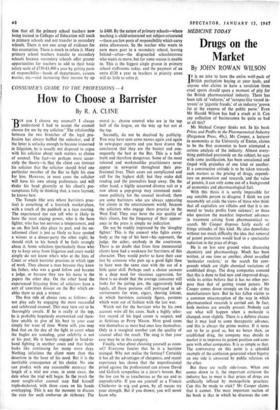How to Choose a Barrister
CONSUMER'S GUIDE TO THE PROFESSIONS —4
By R. A. CLINE
.nur can I choose my counsel? I always El understood I had to accept the counsel chosen for me by my solicitor.' The relationship between the two branches of the legal pro- fession has always baffled the onlooker, and if the latter is unlucky enough to become immersed in litigation, he is usually not disposed to argue with his solicitor about such matters as choice of counsel. The fact—or perhaps more accur- ately the theory—is that the client can instruct his solicitor that the solicitor should brief one particular member of the Bar to fight his case for him. However, in most cases the solicitor will have his own strong preferences and will shake his head gloomily at his client's pre- sumptuous folly in thinking that, a mere layman, he knows best.
The Temple (the area where barristers prac- tise) is something of a livestock market-place, with a touch of the paddock at a race meeting. The experienced eye can tell who is likely to have the most staying power, who is the born fighter, who has too nervous a temperament, and so on. But luck also plays its part, and the un- informed client is just as likely to have spotted a winner at a dinner-party the other night; he should stick to his hunch if he feels strongly about it. Some solicitors (particularly those who try to keep away from litigation and court work) simply do not know who's who at the Inns of Court or which barrister practises in which type of work. They choose a man because they knew his father, who was a good fellow and became a judge, or because they saw his name in the papers the other day. On the other hand the experienced litigating firms of solicitors have a sort of unwritten dossier on the Bar which en- ables them to pick a winner.
The first rule of choice runs as follows: do not play safe by engaging the most successful and celebrated counsel. This may turn out to be thoroughly unsafe. If he is really at the top, he is probably hopelessly overworked and there- fore unable to give of his best to your case simply for want of time. Worse still, you may find that on the day of the fight in court when the bugles are sounding, your celebrity is not at his post. He is heavily engaged in hand-to- hand fighting in another court and that battle looks like continuing for many more days. Nothing infuriates the client more than this desertion in the hour of his need. But it is the inevitable consequence of his choice. No one can predict with any reasonable accuracy the length of a trial nor even, in some cases, the date when the trial will begin. In the result the most sought-after counsel may find himself triple-deckered, with three cases on his hands overlapping. This is not the moment to discuss the cure for such embarras de richesses. The
moral is : choose counsel who are in the top half of the league, on the way up but not at the top.
Secondly, do not be deceived by publicity. You may have seen some names again and again in newspaper reports and you have drawn the conclusion that they are the busiest and con- sequently the best at the Bar. This is a half- truth and therefore dangerous. Some of the most talented and workmanlike practitioners never appear in newsprint throughout their pro- fessional lives. Their cases are complicated and call for the highest skill; but they make dull reading and the journalists keep away. On the other hand, a highly seasoned divorce suit or a row about a pop-group may command maxi- mum publicity for the counsel involved; there are some barristers who are always appearing for clients in the entertainment world, because the solicitors who engage them practise in the West End. They may have the star quality of their clients, but the frequency of their appear- ance in the press is simply no indication.
Do not be readily impressed by the 'doughty fighter.' This is the counsel who fights every- body at the top of his bent—his opponent, the judge, the usher, anybody in the courtroom. There is no doubt that from time immemorial clients have had a weakness for barristers of this character. They would prefer to have their case lost by someone who puts up a good fight than to have won the same case with the use of a little quiet skill. Perhaps such a choice answers to a deep need for vicarious aggression, for there is no doubt that the average consumer still looks for the jutting jaw, the aggressively held lapels, all those postures still portrayed in ad- vertisements for wine, cigars, shaving lotions, in which barristers curiously figure, postures which went out of fashion with the last war.
Watch out for the barrister who by his own account wins all his cases. Such a highly selec- tive record of his legal career is suspect, and as fictitious as Perry Mason. Most good cases win themselves as most bad ones lose themselves. Only in a marginal number can the quality of counsel affect the result. The snag is that your case may be in this category.
Finally, what about choosing yourself as coun- sel? Everyone fancies that he is a barrister manqué. Why not realise the fantasy? Certainly it has all the advantages of cheapness, and recent experience has shown that the unprofessional pitted against the professional can arouse David and Goliath sympathies in a juror's bosom. But the law can be as treacherous as the sea and as unpredictable. If you see yourself as a Francis Chichester in wig and gown, by all means try your strength. But if you drown, you will never know why.






























 Previous page
Previous page